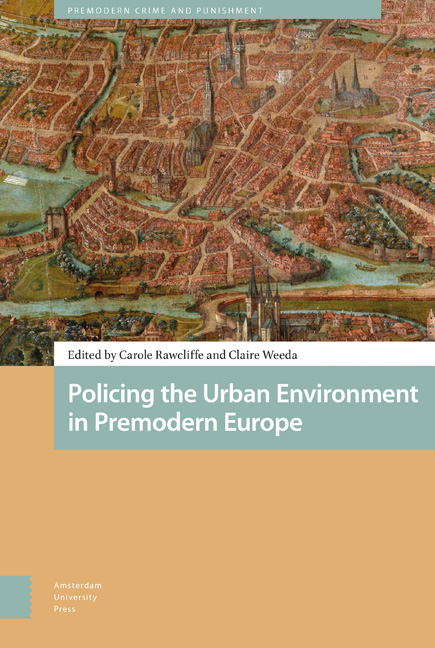Book contents
- Frontmatter
- Contents
- List of Illustrations
- List of Figures and Charts
- Introduction
- 1 Cleanliness, Civility, and the City in Medieval Ideals and Scripts
- 2 The View from the Streets: The Records of Hundred and Leet Courts as a Source for Sanitary Policing in Late Medieval English Towns
- 3 Urban Viarii and the Prosecution of Public Health Offenders in Late Medieval Italy
- 4 Food Offenders: Public Health and the Marketplace in the Late Medieval Low Countries
- 5 Policing the Environment of Late Medieval Dordrecht
- 6 Muddy Waters in Medieval Montpellier
- 7 Regulating Water Sources in the Towns and Cities of Late Medieval Normandy
- 8 Policing the Environment in Premodern Imperial Cities and Towns: A Preliminary Approach
- 9 Official Objectives of theVisitatio Leprosorum: Ambiguity, Ambivalence, and Variance
- Index
2 - The View from the Streets: The Records of Hundred and Leet Courts as a Source for Sanitary Policing in Late Medieval English Towns
Published online by Cambridge University Press: 21 November 2020
- Frontmatter
- Contents
- List of Illustrations
- List of Figures and Charts
- Introduction
- 1 Cleanliness, Civility, and the City in Medieval Ideals and Scripts
- 2 The View from the Streets: The Records of Hundred and Leet Courts as a Source for Sanitary Policing in Late Medieval English Towns
- 3 Urban Viarii and the Prosecution of Public Health Offenders in Late Medieval Italy
- 4 Food Offenders: Public Health and the Marketplace in the Late Medieval Low Countries
- 5 Policing the Environment of Late Medieval Dordrecht
- 6 Muddy Waters in Medieval Montpellier
- 7 Regulating Water Sources in the Towns and Cities of Late Medieval Normandy
- 8 Policing the Environment in Premodern Imperial Cities and Towns: A Preliminary Approach
- 9 Official Objectives of theVisitatio Leprosorum: Ambiguity, Ambivalence, and Variance
- Index
Summary
Abstract
Late medieval English leet court records are an underused resource for the study of public health. Yet, as this chapter reveals, they offer a remarkable, often unique, insight into ‘grassroots’ responses to insanitary nuisances and the enforcement at neighbourhood level of regulations concerning the urban environment. These courts functioned at the very bottom of the judicial hierarchy, serving as a useful vehicle for the implementation of bylaws and similar directives, as well as the dissemination of whatever basic information (such as the need to avoid contaminated air during epidemics) the ruling elite wanted ‘ordinary’ people to have. In turn, they gave local communities an opportunity to complain about hazards that required official action and to protest should the response prove inadequate.
Key words: communities; environmental/public health; leet courts; medieval England; urban nuisances
During the early 1870s, the distinguished medievalist H.T. Riley compiled a report on the municipal archives of Hythe in Kent. With his customary eye for detail, he drew attention to the many health hazards investigated by the local hundred court, including the noxious ‘hoggisty’ (pigsty) kept in 1422 by one Stephen Sare, ‘which smells very badly and is abominable to all men coming to market, as well as to all dwelling in the town’. The proceedings of a session held on 14 January 1409 revealed such a plethora of sanitary offences (mostly to do with the dumping of dung and rubbish ‘to the public nuisance’ in roads, wells, and waterways) that Riley could barely contain his disgust. Even the ‘few extracts’ which he presented to his readers revealed ‘a state of such utter filth and squalor that we are not at all surprised to learn […] that the place was devastated by pestilence’.
Few of today's historians of premodern medicine would share Riley’s Victorian sensibilities, or his ‘Whiggish’ assessment of medieval attempts at environmental improvement. They might, indeed, be more inclined to regard such evidence as proof that the inhabitants were doing their best, in difficult circumstances, to contain the sort of behaviour that was believed to cause epidemic disease.
- Type
- Chapter
- Information
- Policing the Urban Environment in Premodern Europe , pp. 69 - 96Publisher: Amsterdam University PressPrint publication year: 2019



